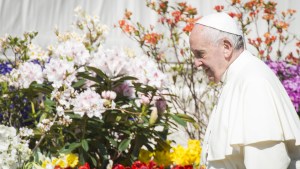Ready for a quiz about love? How would you answer these questions?
- True or false? “All love counts.”
- True or false? “There is no such thing as too much love.”
- True or false? “Love is the only thing that matters.”
Let me help you stretch the rules a bit: You must begin answering these “true or false” questions with, “It depends.” If by “love” you mean, “the very strong emotions I’m feeling right now,” then you must answer with, “False.” Feelings, especially intense ones, bloom and fade quickly. They’re not a sufficient foundation for love. Also, strong feelings can cloud or even smother rational judgment. Finally, feelings, especially the intense ones, can easily be attached to unworthy objects, or can be disproportionate. Like every important human aspiration, the proper exemplar and measure is found in God.
The Medievals spoke of amor benevolentiae—which is poorly translated as “benevolent love”—but it means so much more! To love someone is to will the best for the beloved. What is the best for any beloved? What is best for every human person is union with God, a union begun in this life and continuing into eternity. That union with God is the fruition of holiness. The most reliable path to holiness, the strongest supports for joyful and fruitful chastity, are found within the authentic life and teaching of the Church founded by Christ—the Catholic Church. Anything contrary to the authentic teaching of the Church entrusted to Her by Christ will preclude the life of holiness for which we were made.
How to love
When it comes to love, St. Ignatius Loyola teaches us how to love as God loves.
This great saint taught that the hallmark of love is the exchange of gifts between the lover and the beloved. Each human person is the beloved of God; our satisfaction, completion, and perfection are found in union with God. In this life, we move towards that union with God by loving as he does.
Saint Ignatius asks us to
…recall to mind the blessings of creation and redemption, and the special favors I have received. I will ponder with great affection how much God our Lord has done for me, and how much He has given me of what He possesses, and finally, how much, as far as He can, the same Lord desires to give Himself to me according to His divine decrees.
Next:
…to reflect how God dwells in creatures: in the elements giving them existence, in the plants giving them life, in the animals conferring upon them sensation, in man bestowing understanding. So He dwells in me and gives me being, life, sensation, intelligence; and makes a temple of me, since I am created in the likeness and image of the Divine Majesty.
Then:
…to consider how God works and labors for me in all creatures upon the face of the earth, that is, He conducts Himself as one who labors. Thus, in the heavens, the elements, the plants, the fruits, the cattle, etc., He gives being, conserves them, confers life and sensation, etc.
Such love, he goes on to say, calls for a response:
Then I will reflect upon myself, and consider, according to all reason and justice, what I ought to offer the Divine Majesty, that is, all I possess and myself with it. Thus, as one would do who is moved by great feeling, I will make this offering of myself:
Take, Lord, and receive all my liberty, my memory, my understanding, and my entire will, all that I have and possess. Thou hast given all to me. To Thee, O Lord, I return it. All is Thine, dispose of it wholly according to Thy will. Give me Thy love and Thy grace, for this is sufficient for me.
Questions
Now we can answer the three questions:
- All love counts only if it is real love; and real love always aims at moving the beloved closer to God by imitating God by working for the best for the beloved, which is God himself.
- If love is “too much,” then it ceases to be love and becomes something else, something that does not help moving the beloved closer to God. True love is measured by the rightness of its purpose (union with God, as God has revealed himself) and not intensity of feelings.
- “Love is all that matters” if the love in question is real love, that is, it includes the truth about human life and divine life, as we can know from the natural law and from Divine Revelation. In other words, real love always considers more than just emotions.

When I write next, I will speak of fostering small Christian communities. Until then, let’s keep each other in prayer.


